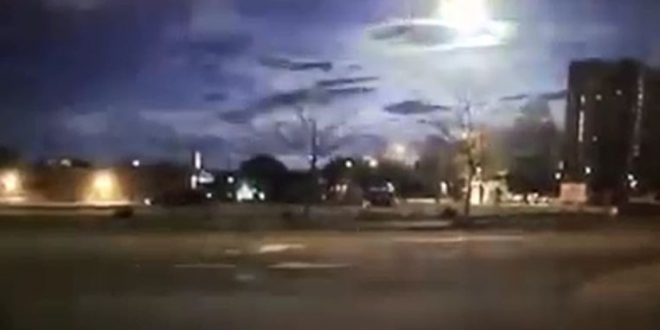A bright meteor burning up in Earth’s atmosphere was captured on the dashcam of a Maine police officer while he was on early morning traffic patrol on Tuesday.
Police Sgt. Tim Farris was patrolling for speeding drivers early Tuesday in Portland, Maine when his cruiser’s dash cam captured the remarkable: a bright and burning mass, hurtling through the night sky.
“Oh my … God,” exclaims a voice in the released video, identified as Officer Graham Hults.
After the fireball streaked over the Northeast at around around 12:50 a.m. Eastern, the American Meteor Society said it had received 240 reports of sightings scattered from New Jersey to Quebec, Canada and parts in between.
A map on the society’s site depicts the reports’ locations with and an estimated trajectory, and asks witnesses of Tuesday’s event to file their own reports of the “the fireball.”
Fireball is a term for a very bright meteor such as the one seen over Portland, the society states. Several thousand fall into the earth’s atmosphere each day, but often over uninhabited areas or in the daytime when they may not be visible.
The Portland Police department later published its footage to Facebook, identifying the flying object as a meteor—or maybe something else.
“Let’s hope the visitors are friendly,” the department said, before making a nod to Portland’s most famous son: “They could just be some of Stephen King’s friends on their way to visit him.”
Later that morning, Vermont radio station Star 92.9 posted a series of images reportedly from a listener that allegedly show the fireball as seen from the town of Greensboro.
University of Southern Maine planetarium manager Edward Gleason said meteoroids are falling from outer space constantly, but that they normally don’t create such a fiery spectacle.
“We know it’s larger than the dust grains. We know it’s not large enough to actually cause any damage, so essentially, there’s no way really to determine accurately how large it is based only on the visuals of the descent,” Gleason said.
The Maine Mineral & Gem Museum is offering a $20,000 reward for anyone who finds a 1-kilogram piece of the meteorite.
Gleason said the odds of finding anything may be astronomical.
It’s exceedingly difficult to be able to determine exactly where that meteorite would be, based upon this object, because it was so high, that it was seen all throughout New England,” Gleason said.
Agencies/Canadajournal
 Canada Journal – News of the World Articles and videos to bring you the biggest Canadian news stories from across the country every day
Canada Journal – News of the World Articles and videos to bring you the biggest Canadian news stories from across the country every day



